The alarming truths revealed in the 2023 National Healthcare Quality and Disparities Report expose a grim reality: Black and Brown communities in the United States are experiencing healthcare disparities at a staggering rate. These inequities are not just numbers on a page; they represent real lives impacted by a healthcare system that systematically marginalizes entire demographics.
Healthcare Quality Assessments Show Systematic Failures
The report underscores a crucial point: healthcare quality assessments are designed to evaluate the effectiveness of health systems in providing patient care that is timely, affordable, and evidence-based. Yet, as reported by the AHRQ, for 21 consecutive years, these assessments have painted a picture of persistent inequities rooted in structural racism and socioeconomic disparities.
Disparities in Access to Care
Access to healthcare should be a fundamental right, not a privilege. However, the data reveals that communities of color are disproportionately affected by barriers to care, with 30% of Black and Brown individuals facing significant obstacles compared to their white counterparts. This stark reality is exacerbated by a health insurance landscape that continues to favor the affluent, as detailed in the Census Bureau"s 2023 report.
Insurance Coverage Gaps Continue to Widen
According to the National Health Interview Survey, the uninsured rate among Black and Latino populations remains disproportionately high. Despite advances in policy, the coverage gap persists, with these groups being more likely to be uninsured and underinsured. The implications of this gap are dire, as those without adequate coverage are less likely to receive preventative care, leading to worse health outcomes.
Healthcare-Associated Infections Add to the Burden
The CDC"s 2023 report on healthcare-associated infections (HAIs) highlights another area of concern. Vulnerable populations, particularly those in marginalized communities, are disproportionately affected by HAIs due to inadequate hospital resources and staffing shortages. This trend not only exacerbates existing health disparities but also calls into question the quality of care that these communities receive.
\n\n
Congressional Hispanic Caucus, Secretary Becerra Highlight ...
Urgent Need for Policy Reform
The consequences of inaction are profoundly concerning. With healthcare costs soaring and the political will to enact meaningful reforms faltering, we are witnessing a perfect storm of inequity. The urgent need for comprehensive policy reform is more pressing than ever as communities continue to fight for equitable access to healthcare. The status quo is unacceptable.
Community Voices Demand Change
Grassroots organizations across the country are rallying for change, demanding that policymakers address these disparities head-on. The voices of those who have been marginalized must be at the forefront of the conversation. It is essential that we shift from a reactive to a proactive approach, ensuring that healthcare is accessible, equitable, and just for all.
Transforming Healthcare for All
We cannot afford to ignore the systemic issues that plague our healthcare system. It is imperative that we recognize and dismantle the structures that contribute to these disparities. The findings of the National Healthcare Quality and Disparities Report serve as a clarion call for action, urging us to envision a healthcare landscape that is equitable, inclusive, and reflective of the diverse fabric of our society. Reform is not just necessary; it is a moral imperative.

Senator Markey Chairs Congressional Hearing in Boston ...

![[Video] Anti-ICE Protester Pepper Sprayed as CBP Agents Disperse Crowd in Minneapolis](/_next/image?url=%2Fapi%2Fimage%2Fthumbnails%2Fthumbnail-1768260677127-y71sb7-thumbnail.jpg&w=3840&q=75)

![[Video] Several injured as U-Haul truck drives through Iranian protestors in Los Angeles](/_next/image?url=%2Fapi%2Fimage%2Fthumbnails%2Fthumbnail-1768176682028-q95y6j-thumbnail.jpg&w=3840&q=75)
![[Video] Scuffle breaks out between Trump supporters and Anti-ICE protesters in Times Square](/_next/image?url=%2Fapi%2Fimage%2Fthumbnails%2Fthumbnail-1768165958203-hgcgb-thumbnail.jpg&w=3840&q=75)


![[Video] Gunfire between Iraqi security forces and Sadr militias in Baghdad](/_next/image?url=%2Fapi%2Fimage%2Fthumbnails%2Fthumbnail-1768343508874-4redb-thumbnail.jpg&w=3840&q=75)
